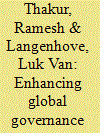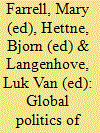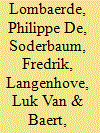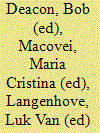|
|
|
Sort Order |
|
|
|
Items / Page
|
|
|
|
|
|
|
| Srl | Item |
| 1 |
ID:
073518


|
|
|
| 2 |
ID:
065393


|
|
|
|
|
| Publication |
London, Pluto Press, 2005.
|
| Description |
xiii, 321p.
|
| Standard Number |
074532262X
|
|
|
|
|
|
|
|
|
|
|
|
Copies: C:1/I:0,R:0,Q:0
Circulation
| Accession# | Call# | Current Location | Status | Policy | Location |
| 050072 | 327.1/FAR 050072 | Main | On Shelf | General | |
|
|
|
|
| 3 |
ID:
151834


|
|
|
|
|
| Summary/Abstract |
The S&T community not only has the potential to play a significant role in addressing global problems, but they can also be the change agent that strengthens the policy-science nexus at the global level of governance.
|
|
|
|
|
|
|
|
|
|
|
|
|
|
|
|
| 4 |
ID:
097922


|
|
|
|
|
| Publication |
2010.
|
| Summary/Abstract |
There is virtually no systematic debate on the fundamentals of comparative research in the study of international regionalism. The field of research is very fragmented and there is a lack of interaction between EU studies and regionalism in the rest of the world. There is also a lack of communication between scholars from various theoretical standpoints and research traditions. Related to these two divides is the tension between idiographic and nomothetic methodologies. The purpose of this article is to contribute to the largely neglected debate on how to conduct and address three interrelated problems: a conceptual, a theoretical and a methodological one. Our claim is that the future of comparative regionalism should be one where old divides are bridged. This requires a combination of conceptual rigor, theoretical eclecticism, and sounder empirical research methods.
|
|
|
|
|
|
|
|
|
|
|
|
|
|
|
|
| 5 |
ID:
111544


|
|
|
|
|
| Publication |
2012.
|
| Summary/Abstract |
States are finding it increasingly difficult to provide good governance in response to today's problems in a globalised world, as they are often either too small or too big to cope with current crises. One of the strategies of states to remedy this situation is to construct regional levels of governance at the supranational or national level. This has led to the creation of diverse forms of regional governance worldwide, thereby ushering in a neo-Westphalian world of states and regions. In order to advance the research agenda of comparative regionalism, scholars need to 'unpack' regions along several conceptual dimensions. This includes seeing regions as economic areas, public goods spaces as well as actors in the international arena. In addition, a distinction needs to be made in studying the projects, processes and products of region building. Moreover, studying regions needs to take into account the discursive context of 'regionalism speak'. Finally, more attention needs to be dedicated to the internal complexity of regionalisms. In sum, comparing regions is not a straightforward exercise, and in some case regions should not be compared with other regions, but with states.
|
|
|
|
|
|
|
|
|
|
|
|
|
|
|
|
| 6 |
ID:
093794


|
|
|
|
|
| Publication |
London, Routledge, 2010.
|
| Description |
xxii, 260 p.
|
| Series |
Routledge advances in international relations and global politics; 79
|
| Standard Number |
9780415456593, hbk
|
|
|
|
|
|
|
|
|
|
|
|
Copies: C:1/I:0,R:0,Q:0
Circulation
| Accession# | Call# | Current Location | Status | Policy | Location |
| 054878 | 320.6/DEA 054878 | Main | On Shelf | General | |
|
|
|
|
|
|
|
|
|